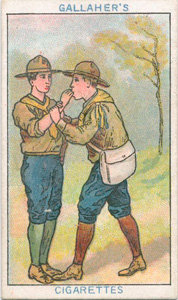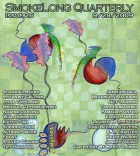Tell us a bit about writing your piece, and how you decided on the title, “They Marched Into Fields.”
Much of the writing of this story came out in a flash (ha). And then there was a lot of revision. I like to be fairly creative with verbs, and, if I can, turn verbs into metaphors. Like in the title, I chose “marched” in revision simply because it’s so much better than “walked”. Of course, in revision (as in, literally re-looking at the story as it developed), it turned out that in some ways these kids are kind of like soldiers, so the verb was apt as well. As any good use of language should be: it is both apt and surprising.
I wanted to create a fairy tale-like feeling with this story. Appropriately, the characters are children. There’s the pastoral setting. There’s the hint of something evil lurking in the distance. I guess that, like the Hemingway cliché about short fiction, most of this story is beneath water. Only the iceberg’s tip is visible.
The ending is very lyrical/visual. Tell us about writing to that ending description.
I knew I wanted to end the story with some strong image. Actually, I guess with everything I write I lean heavily on the senses. I suppose I try to hit the reader with many sensory details and as high a metaphorical register as I can. So I wanted to get images into the story that resonated. As for lyricism, I think the division between genres—at all times, but especially in flash fiction and prose poetry, for example—are a little ridiculous. At least, as a reader myself, I’m not interested in “fiction” that doesn’t pay attention to language, or is so wholly devoted to narrative that the beauty of the story’s rendering in language is ignored. I suppose that I disagree (a bit, and only a bit) with John Gardner when he says that language that draws too much attention to itself draws the reader out of the fictive dream. (Gardner does have that whole spiel where he compares the Melville of I believe it was Typee to the Melville of Moby-Dick, and he shows how much more poetry there is in the more mature writer.) I feel that narrative that doesn’t pay enough attention to language is boring.
“It sounded like she was deep inside a cave, locked away, which, of course, she was.” Can you comment on this moment in the story?
That’s funny that you point out that moment, as some writer-pals have commented with some hilarity on what we’ve started to call my “nonaphors,” or metaphors that end up not being metaphors at all. While on the one hand, as Michelle is stuck in her brother’s headlock, she feels that she’s trapped in a cave, on the other hand, the narrator tells us that she “literally” is enclosed. She’s hemmed in by being the middle child, and she’s the only girl. It’s more of a conceit than a metaphor. So, I think Michelle’s got it kind of tough: her brothers make fun of her, and rough around with her, and she’s got to kind of find her “happy place.” And we find that her outlet is both mental and physical in her perception of the natural world, and the “attention” she gets from a boy and another man who are outside her family, and about whom the rest of Michelle’s family knows nothing. I did mean for there to be the sense of something sinister underlying that. It’s only implied, and I don’t know what might be going on in that barn between Michelle, the boy, and his father, but I get the feeling that it’s not completely innocent.
What are you working on in your writing now?
Right now I’m trying to stay afloat with a four-course load for the semester, so I actually haven’t had much time to write. But, I’m working on a book of “prose poems” (some are very story-like, and are probably stories more than poems, but, well, you know) that is called “The Book of Freaks.” I have a book of lined poetry, “Metal Penelope,” that I’m shopping around, but I’m not a big fan of contests, and in the poetry world, it’s hard to find publishers with open submissions that do not require a contest reading fee. I have a more-or-less finished novel-in-stories, “Our Lady of Refuge,” and a currently-being-re-written novelette-play, “Maybe Burning Man Wasn’t Such a Good Idea.” There’s another story collection—longer-length, more “traditional” fiction—I’m currently calling “Bigger Badder Faster Louder,” with the members of the late 80s hair metal band Nitro as focal characters. I have too many projects.
You’ve got a book coming out in October through Orange Alert Press: Prose. Poems. A Novel. Tell us about it.
The title tells all: this is a book written in prose, in highly poetic individual pieces (many editors in the magazines, where individual pieces were first published, insisted that they were prose poems, and others maintained that they were flash fictions) that, when put together, form a world filled with characters who live through a narrative arc, and the book ultimately concludes with a main character’s life being radically altered. So, it’s also at least novel-like. I started writing these snippets of language-intense prose in the fall of 2007, when I returned from the Bread Loaf Writer’s Conference, and while I was reading Swann’s Way, from Proust’s In Search of Lost Time. Ironically, Proust’s lovely, but long-winded prose style got me into these short lyric bursts that are (sometimes) painfully sensitive. The book’s about a guy who’s a fuck-up who keeps fucking up but who finally ends up trying to do right. The book will have full-color illustrations by Christy Call, a really great Chicago-based artist, who has done covers for Matt Bell and for one of my chapbooks. It’s sure to be a hoot. The book’s release is October 20th 2009.


